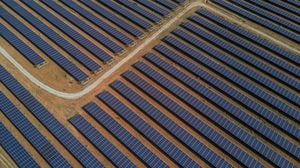China's ambitious global economic strategies have led it to invest billions of dollars on infrastructure projects around the world, significantly extending its influence across various continents. Highlighting this trend is the recent launch of the mega-port project at Chancay, Peru, which costs around $3.5 billion, aimed at bolstering trade ties between Asia and Latin America. This state-of-the-art facility will reduce shipping times from Asia to Latin America's western coast from 35 days to just 23, with projected revenue reaching as high as $4.5 billion annually.
Chinese President Xi Jinping inaugurated the Port of Chancay during the Asia-Pacific Economic Cooperation (APEC) summit, marking the significance of this trade route. While China is solidifying its position as Peru's largest trading partner, the United States has been quick to respond, albeit with far less impressive offerings. Rather than contributing to significant infrastructure development, U.S. officials have suggested providing aging trains as part of their support for Peru, leading many to question the efficacy of U.S. involvement.
Initially, U.S. Secretary of State Antony Blinken announced the donation of 40-year-old diesel trains from California, which the press quickly revealed to be sold, not donated, to the city of Lima for over $6 million. This embarrassing blunder has highlighted the inadequacy of U.S. responses to China's extensive investments. Critics argue it reflects broader weaknesses in American foreign policy, particularly with regard to Latin America, where U.S. intervention has historically faced strong opposition.
China's offerings stand out starkly against this backdrop. Beyond the immediate economic benefits, projects like the Port of Chancay are emblematic of China's Belt and Road Initiative (BRI), which has invested over $1 trillion globally. These investments are seen as part of China's strategy to diversify its economic relationships and gain footholds across the Global South, fulfilling Xi Jinping's vision of South-South cooperation.
Meanwhile, the U.S. is grappling with its own challenges. The response to the Chancay port project doesn't just display the limitations of U.S. diplomacy but also reflects the perception among many Latin American countries of being caught between two major world powers. Political leaders across the region have emphasized their independence, pushing back against rhetoric depicting them as subservient to U.S. interests.
Notably, China's foray isn't limited to Peru. The Chinese are eyeing other regions, especially Africa, where they are significantly investing to secure resources and build partnerships. For example, as gold prices surge, Chinese investments are increasingly targeting mining sectors in countries like South Africa and Ghana. Investments have been touted not only for their economic returns but for their potential to generate thousands of jobs and stimulate local economies.
The strategic importance of China's control over valuable minerals like cobalt and nickel cannot be overstated either. With the global shift toward green technologies, these resources are becoming increasingly influential. China has recognized this by supporting mining operations across the African continent, positioning itself to lead the way as green energy demands rise.
Interestingly, the geopolitical climate is becoming more volatile, particularly with the looming return of Donald Trump to the U.S. presidency, stirring fears over increased tariffs on Chinese imports. Analysts suggest this backdrop could lead Chinese firms to accelerate their overseas mergers and acquisitions, exploring markets less vulnerable to economic threats from Washington. Such strategic moves could mitigate reliance on traditional markets and capitalize on the growing appetite for Chinese products and investments.
Overall, as the tug-of-war for influence intensifies, China's efforts seem to be framing the narrative. The hold on significant infrastructure projects and resource-rich investments highlights the challenges the U.S. faces if it doesn’t adjust its approach. Observers argue the U.S. needs to present more substantial offers to these developing markets to counteract China's growing hegemony.
Reflecting on the bigger picture, the global south is now presented with alternatives, and many are favoring development partnerships with China over the U.S. The roots of this shift run deep, stemming back to historical experiences with colonialism and interference from western powers. The emergence of China's Belt and Road Initiative and the associated investments has offered countries the promise of economic growth, resiliency, and development tailor-fit to their needs.
So, as we look forward, the question remains: will the United States recognize these fundamental changes and adjust its strategies to remain relevant on the global stage? Or will it continue to lean on outdated approaches locked within the confines of its historical narrative? One thing is for sure; China's engagements with nations across all continents are redefining global partnerships and challenging the traditional models of influence and aid.



